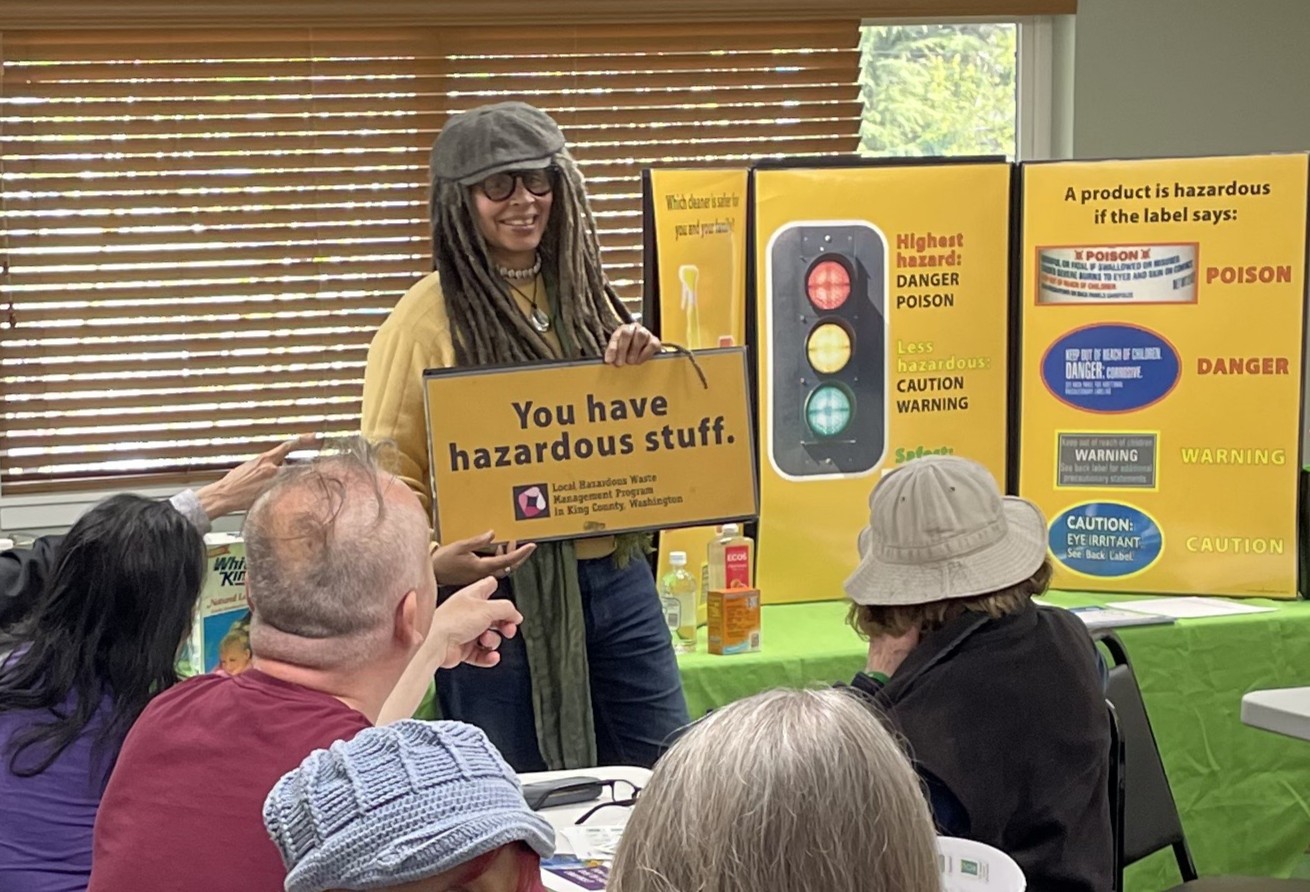Bridging arts and environmental justice to address hazardous waste
Haz Waste Program educator Jourdan Imani Keith shows the value of building awareness through creativity and community.

If you ask Jourdan Imani Keith to describe herself, she might start with the translated meaning of her full name: “‘Descending faith from the forest,’ or ‘Descending faith from the battle.’”
“I think my name represents a lot of both my personal and professional trajectory,” Jourdan says.
In many ways, those two trajectories are exquisitely intertwined. From her early days as a born-and-raised Philadelphian to her journey westward to Wyoming then Seattle, she has always been a writer at heart. She’s put those skills as a writer to use in a variety of ways, both personally and professionally: as an investigative journalist, a poet, a playwright, an essayist, an educator, and an organizer. In every capacity, she’s explored topics ranging from nature and environmental justice to examinations of identity and community.
Jourdan brings those years of research, introspection, and expertise to her work as an educator consultant for the Hazardous Waste Management Program. And as a revered literary artist, she leverages her connections to the local art community to redefine the way the Haz Waste Program delivers its messages of environmental protection and public health.
“All of my work as a writer, as a creative writer, as a journalist, and then as community organizer, they all intersect around public health,” Jourdan says. “That’s why the Haz Waste Program appealed to me.”
Jourdan is a member of the Haz Waste Program’s Residential Services team. This team performs critical outreach efforts, such as conducting lead exposure investigations and organizing educational workshops for King County residents. A big part of their work depends on partnering with community groups to build trust with the people who are most at risk of toxic exposures.
“We support people to get expert information and get the technical support they need. Then they can take that information and craft it in a way that serves the community,” Jourdan says. She says her partners, which include local nonprofits and government agencies, help the Haz Waste Program find the best ways to reach the people they serve and represent. “They can show us how to really make our programs fun, viable, and engaging.”
And Jourdan has a knack for making fun programming.
Recently, Jourdan and her Residential Services colleagues worked with Seattle environmental artist Marita Dingus and art nonprofit Wa Na Wari to create a community workshop that teaches safer, less-toxic cleaning methods. At the workshop, which was supported by a grant from the Haz Waste Program, participants used materials that might otherwise be thrown away. Items that could be recycled were set aside, and the remaining material was used to create a community-sourced sculpture.
“Arts as a tool for engagement is a long-studied tool. It’s very effective for bringing people in,” Jourdan says. “To bring people together, you have to do something that's calming and soothing. And the arts are proven to be a way that allows people to hear, see, perceive, and reflect how something could be personally effective for them.”
Jourdan says it can be a challenge to earn trust in different communities, particularly as a government agency. But as someone who has been using the arts to build networks in King County for decades, she says the key is to stay tapped into those networks.
“The first step is to really look at what is being expressed by the community members that you're in touch with. What is the priority for them? What is happening that we can see as an opportunity to support them? And the mutuality of it leads to the support for our work,” Jourdan says.
Like her name suggests, Jourdan Imani Keith is a messenger. She champions a vision of a safer and healthier world, and she brings the Haz Waste Program together with new partners across King County to boost that vision. As the Program seeks to expand its impact in vulnerable communities, Jourdan’s unique personal and professional styles of connecting couldn’t be more valuable.
More info
- Work with Haz Waste Program educators and experts like Jourdan to protect and improve public health and environmental quality in your community. For more information, contact us at haz.waste@kingcounty.gov or 206-296-4692.
- Jourdan and her Haz Waste Program colleagues will be at the upcoming Refuge Outdoor Festival, Aug. 22-24, in Carnation! Stop by their booth and contribute to their “Poetree” collaborative art piece that symbolizes protecting public health and the environment. Click here for tickets and more information.

 Translate
Translate